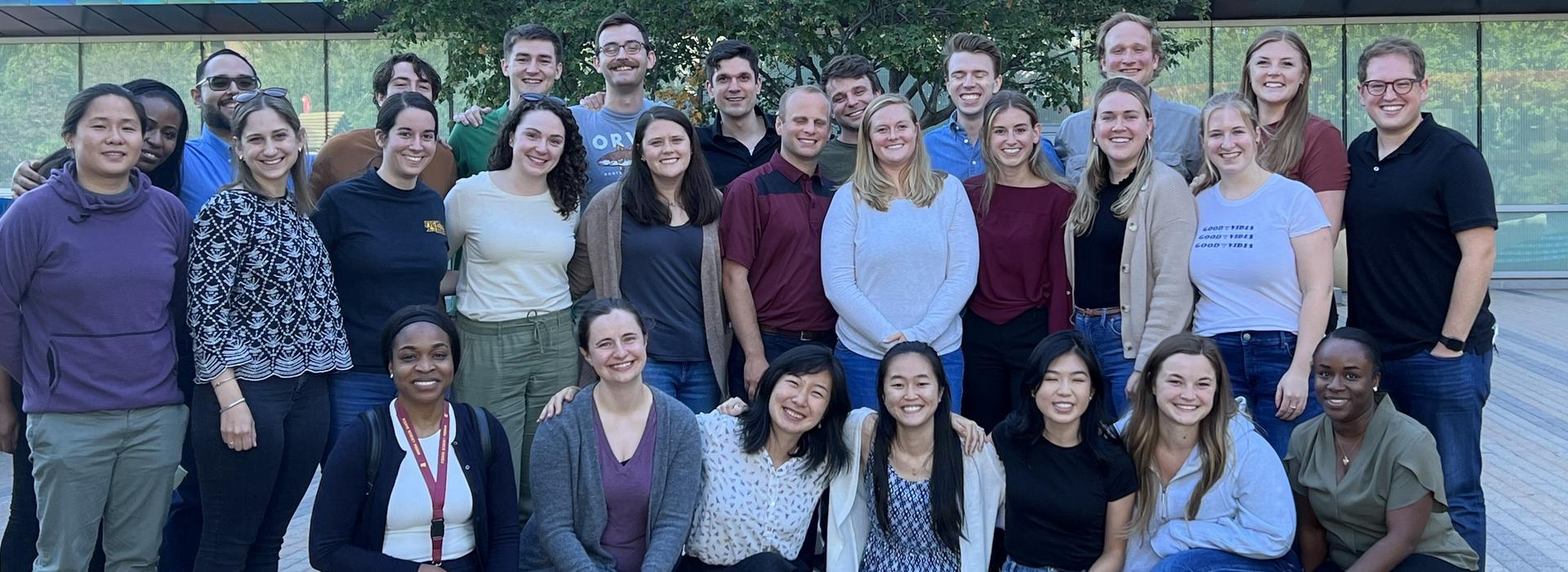
Pediatric Residency Program
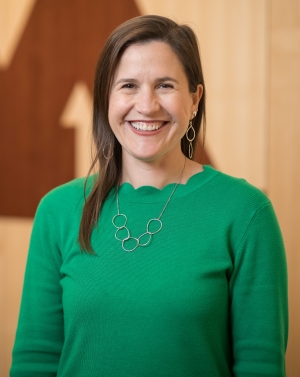
Welcome to the University of Minnesota Pediatric Residency’s webpage! I hope you’ll be able to use this website as a jumping-off point to learn about the incredible training opportunities available in our residency program. It has been my privilege and honor to be a part of the educational leadership team in our program for the past 13 years. When applicants ask me what makes our program stand out, the answers are easy.
We are excited to share what our program has to offer. Your safety and health is incredibly important to us, and as such we will only be offering virtual interviews this season. More information will be posted on that soon.
For more information on the program, please be sure to browse the links on the right of this page, as well as check out our video shorts linked here. I wish you all the best as you explore your future career in pediatrics!
Emily Borman-Shoap, MD
Residency Progam Director
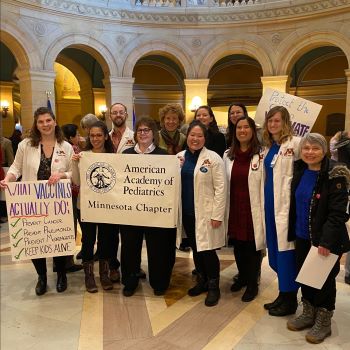
Innovation in Education
Innovation and continuous re-invention are at the heart of our educational approach at the University of Minnesota. Recent projects include the implementation of academic half days and a new longitudinal quality improvement curriculum for second-year residents.
Community and Advocacy Opportunities
Through a strong partnership with the state chapter of the AAP, as well as role modeling from faculty throughout our program, residents at our program are deeply invested in connecting with their communities. Our program continues to work with our local community partners finding ways to create regular video content to share with local families during time of social distancing and assisting Hennepin Healthcare’s mobile clinic.
Block Education
- Academic Half Days are most Friday afternoons from September through June.
- All residents attend (except those on nights or PTO)
- 3 year curriculum:
- Year 1: Infant/Early Childhood
- Year 2: School-Age
- Year 3: Adolescence
Simulation
The program is home to a cutting-edge, longitudinal mock-code simulation curriculum spanning across the four hospital sites. This initiative is designed to prepare all residents for potential emergency situations encountered in clinic, on the inpatient wards, and in the emergency department.
Noon Conferences
- Noon conferences at the U of M Masonic Children’s Hospital and Children's Minnesota - Minneapolis and St. Paul
- Use of educational threads to guide content and frequency of conference types
- Examples include: Morbidity, Mortality and Management, Resident and Fellow Research Spotlight, Collaborative Office Rounds in Pediatric Mental Health, Wellness topics such as Debriefs and Narrative Writing, Board Review
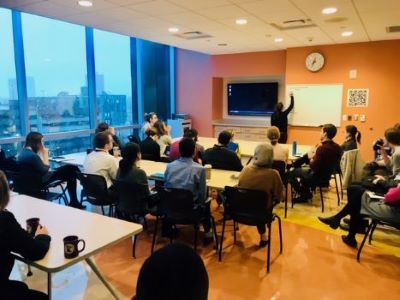
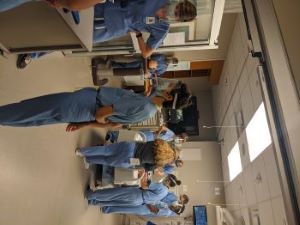
Residents are encouraged to engage in scholarship during residency. The Program works with interested residents to identify and select faculty mentors for academic projects. Block education sessions devoted to fundamentals of the research process are provided to all residents. Several local and national meetings provide venues for residents to present their findings. These include our Departmental Pediatric Research and Scholarship Symposium (PRESS), Grand Rounds, the Minnesota American Academy of Pediatrics Meetings, the Midwest Society for Pediatric Research, American Pediatric Society/Society for Pediatric Research, American Academy of Pediatrics Annual Meeting, plus a host of subspecialty-focused meetings.
The University of Minnesota Pediatric Residency Program supports residents in all 3 years of residency who are pursuing scholarly projects in advocacy, basic science or clinical research, and medical education. Residents also have protected time for research electives and are eligible to receive stipends for attending any relevant research conferences.
Residents can earn cash prizes for their scholarly activities through P-QUAD (Positive Peer Pressured Productivity), a novel program from the University of Minnesota Department of Pediatrics. All scholarly projects in these areas, plus global health and quality improvement are all eligible for entry, and residents can win prizes at regular drawings. This program has been implemented in the hospitalist group and has recently been rolled out for residents.
You can follow this link to learn more about pediatric research here at the U of M.
Class Representatives: Class representatives meet with Dr. Borman-Shoap every other month in a casual setting to provide feedback on the residency program. Everyone is welcome to be a class representative, and each class has two lead class representatives who are responsible for making sure that someone from their class will be able to attend each meeting.
Equity, Diversity, and Inclusion Council: Residents are represented on the faculty and staff EDI council, which meets once a month. More information on the council can be found here.
Pediatric Trainee Diversity Council: This council is newly formed and will examine our learning environment broadly, including mistreatment and harassment, feedback, and inclusion. The Council will be advisory to the Vice Chair of Education and Vice Chair of Faculty Development to help tailor faculty development initiatives. The Council will review trainee curriculum to ensure that health equity, diversity, and inclusion are well-represented. Finally, the council will plan broader health equity and diversity initiatives. They will also focus on individual skill building and reflection, including guided readings to help inform their work.
Program Evaluation Committee: This committee is responsible for evaluating all of our rotations and our curriculum overall. The committee is made up of program leadership, faculty, fellows, and residents who meet quarterly. Additionally there is a rolling series of meetings where the committee meets with the faculty who teach our trainees to give them feedback regarding their rotation.
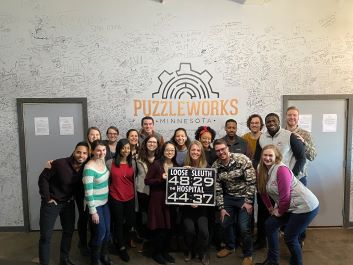
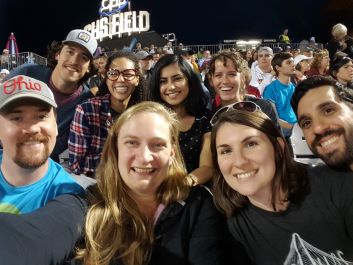
Education in Pediatrics Across the Continuum (EPAC) Pilot Program
EPAC is a national medical education pilot project that seeks to establish a model for true competency-based medical education across the undergraduate medical education (UME) - graduate medical education (GME) continuum. In this program, learners are advanced along the UME-GME continuum by demonstrated competence, not time: time variable, outcome known; as opposed to outcome variable, time known.
The University of Minnesota is 1 of 4 medical schools nationally who participate in this pilot project. The other schools include the University of California San Francisco (UCSF), the University of Colorado and the University of Utah. It is sponsored by the Association of American Medical Colleges (AAMC) and developed in collaboration with the Liaison Committee on Medical Education (LCME), Accreditation Council for Graduate Medical Education (ACGME), and the American Board of Pediatrics (ABP). It received support from the Josiah Macy, Jr. foundation during its inception.
As a Pediatric Resident at the University of Minnesota you will have resident colleagues who are EPAC participants in the GME portion of the project and there will be EPAC students in the UME portion of the project who work with you as learners. Lessons learned are helping to shape our overall approach to curriculum design and evaluation in the Pediatric Residency Program.
Participation in EPAC shows, yet again, that the University of Minnesota Pediatric Residency is committed to medical education innovation!
Why the University of Minnesota?
View Our Social Media
Any Further Questions?
Contact us at:
2450 Riverside Avenue
Room M136, East Building
Minneapolis, MN 55454
Phone: (612) 624-4477
Fax: (612) 626-7042
pedsres@umn.edu